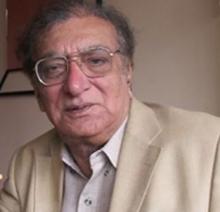Juz Tere Koi Bhi Din Raat Na Janay Mere TU Kahan Hai Magar, Ay Dost Puraanay Mere ?
TU Bhi Khushbu Hai Magar Mera Tajassus Bekaar Barq-e-Avaara Ki Manind Thikhane Mere
Shama Ki Lau Thi Ke Wo TU Tha Magar Hijr Ki Raat Dair Tak Rota Raha Koi Sirhaane Mere
Khalq Ki Bekhabri Hai Ke Meri Rusvaai Loog Mujh Ko Sunate Hain Fasaane Mere
Lut Ke Bhi Khush Hun Ashkon Se Bhara Hai Daman Dekh Ghaarat-e-Dil Ye Bhi Khazane Mere
Aaj Ek Aur Baras Beet Gaya Os Ke Bagair Jis Ke Hote Hue Hote Thay Zamane Mere
Kash TU Bhi Meri Aavaaz Sunta Ho Phir Pukara Hai Tujhe Dil Ki Sadaa Ne Mere
Kash TU Bhi Kabhi Ajaye Masihai Ko Loog Aate Hain Bohat Dil Ko Dukhane Mere
Kaash Auron Ki Tarah Main Bhi Keh Sakta Baat Sun Li Hai Meri Aaj Khuda Ne Mere
TU Hai Kis Haal Main Ay Zud Faraamosh Mere Mujh Ko Tou Chhin Liya Ehd-e-Vafa Ne Mere
Charagar Tou Bohat Hain Magar Ay Jaan-e-“Faraz” Juz Tere Aur Koi Gham Na Jane Mere

Ahmad Faraz, the name that resonates with poetry enthusiasts, stands as a towering figure in the realm of Urdu literature. Born as Syed Ahmad Shah in Kohat, British India, on January 12, 1931, Faraz became one of the most celebrated and beloved poets of his time. His profound words, rich metaphors, and poignant expressions captured the hearts and minds of countless readers, cementing his legacy as a master poet.
Faraz's poetry is characterized by its depth, intensity, and the ability to touch the deepest recesses of the human soul. His verses delve into themes of love, loss, longing, revolution, and social justice, reflecting the trials and tribulations of the society he lived in. Faraz possessed an uncanny talent for weaving together words that evoked strong emotions, often stirring a sense of longing, melancholy, or hope within his readers.
One of the distinctive aspects of Faraz's poetry is his mastery of the ghazal form. He revitalized this traditional poetic form, infusing it with his unique style and contemporary sensibilities. His ghazals are replete with captivating imagery, thought-provoking symbolism, and a lyrical quality that sets them apart. Faraz had an innate ability to capture the nuances of human relationships, particularly the bittersweet nature of love, with remarkable finesse.
Throughout his poetic journey, Faraz remained a voice of dissent and resistance. His verses became a powerful medium to criticize social and political injustices, and he fearlessly confronted the prevailing power structures of his time. He spoke for the downtrodden, the marginalized, and the voiceless, embodying the spirit of a true poet-activist.
Faraz's poetry not only resonated within the confines of his native Pakistan but transcended borders, touching the hearts of Urdu poetry enthusiasts worldwide. His words became an integral part of the cultural fabric, inspiring generations and leaving an indelible mark on the literary landscape.
Ahmad Faraz breathed his last on August 25, 2008, leaving behind a rich body of work that continues to inspire and captivate readers to this day. His verses remind us of the power of words, the beauty of language, and the profound impact that poetry can have on society.
In the realm of Urdu poetry, Ahmad Faraz's name shines like a radiant star, forever illuminating the hearts of those who seek solace, inspiration, and an unfiltered expression of the human experience. His legacy remains an eternal testament to the enduring power of poetry to touch the very core of our existence.
Hum na hotey to kisi aur ke charchey hotey, Halqat*-e-sheher to kehne ko fasaaney mangey..
(halqat;public)
Ye Jo Sargashta Se Phirtay Hain Kitaabon Waalay In Se Mat Mil Ke Inhain Rog Hain Khwaabon Waalay
Ab Meh-o-Saal Ki Mohlat Nahi Milnay Wali Aa Chukay Ab Tou Shab-o-Roz Azaabon Waalay
Ab Tou Sab Dashna-o-Khanjar Ki Zabaan Boltay Hain Ab Kahaan Loog Mohabbat Ke Nisaabon Waalay
Jo Dilon Per Hee Kabhi Naqab Zani Kartay Thay Ab Gharon Tak Chalay Aaye Wo Naqaabon Waalay
Zindah Rehnay Ki Tamanna Ho Tou Ho Jaatay Hain Faakhtaaon Ke Bhi Kirdaar Aqaabon Waalay
Na Mere Zakham Khilay Hain Na Tera Rang-e-Hina Ab Ke Mausam Hee Nahi Aaye Gulaabon Waalay
Yun Tou Lagta Hai Ke Qismat Ka Sikander Hai “Faraz” Magar Andaaz Hain Sab Khaana Kharaabon Waalay
Huaa hai tujh se bicharney ke baad ab maloom, Ke tu nahin tha, tere sath aik dunyaa thi..
Humi ne tark-e-taluq main pehel ki ke Faraz, Woh chahtaa tha magar hauslaa na tha us ka..
Beniyaaz-E-Gham-E-Paimaan-E-Wafa Ho Jana, Tum Bhi Auron Ki Tarah Mujhse Juda Ho Jana,
Main Bhi Palkon Pe Saja Lunga Lahoo Ki Boondein, Tum Bhi Paabasta-E-Zanjeer-E-Heena Ho Jana,
Khalq Ki Sang-Zani Meri Khaton Ka Sila, Tum Tou Masoom Ho, Tum Door Zara Ho Jana,
Ab Mere Waaste Tariyaq Hai Ilhaad Ka Zeher, Tum Kisi Aur Pujaari Ke Khuda Ho Jana
Yeh kya ke beyaan sab se dil ki haaltain karni, Faraz tujh ko na aayin mohabbtain karni..
Abhi abhi woh mila tha hazaar batain kin, Abhi abhi woh geya hai magar zamaana hua..
Zikr us ka hi sahi bazm main bethe ho Faraz, Dard kesa hi uthay hath na dil par rakhna..
Itne Bhi Tou Wo Khafaa Nahi Thay Jaisay Kubhi Aashna Nahi Thay
Maana Ke Behem Kahan Thay Aisay Per Yun Bhi Judaa Judaa Nahi Thay
Thi Jitni Bisaat, Ki Parastish Tum Bhi Tou Koi Khudaa Nahi Thay
Had Hoti Hai Tanz Ki Bhi Aakhir Ham Tere Nahi Thay, Jaa Nahi Thay
Kis Kis Se Nibhaatay Rafaaqat Hum Loog Ke Bewafa Nahi Thay
Rukhsat Howa Wo Tou Mein Ne Dekha Phool Itnay Bhi Khushnuma Nahi Thay
Thay Yun Tou Hum Oski Anjuman Mein Koi Hamain Dekhta, Nahi Thay
Jab Osko Tha Maan Khud Pe Kia Kia Tab Ham Bhi “Faraz” Kia Nahi Thay
